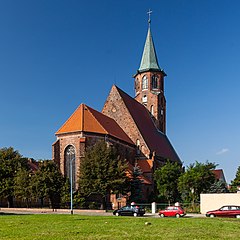Ścinawa
| Ścinawa | ||
|---|---|---|

St John's parish church
|
||
|
||
| Coordinates: 51°24′40″N 16°25′23″E / 51.41111°N 16.42306°E | ||
| Country | Poland | |
| Voivodeship | Lower Silesian | |
| County | Lubin | |
| Gmina | Ścinawa | |
| Area | ||
| • Total | 13.54 km2 (5.23 sq mi) | |
| Population (2006) | ||
| • Total | 5,934 | |
| • Density | 440/km2 (1,100/sq mi) | |
| Website | http://www.scinawa.pl/ | |
Ścinawa [ɕt͡ɕiˈnava] (German: Steinau an der Oder) is a town and municipality on the Oder river in the Lower Silesian region of Poland. The town features a number of historic monuments including city hall (19th century) and the town church (1209). The Ścinawa train station is a key gateway for travel throughout the region, connecting major destinations such as Wrocław and Głogów. The current mayor of Ścinawa is Andrzej Holdenmajer. Presently, the town's population is 6,053. Between 1975 and 1998, Ścinawa was in Legnica Voivodeship. It is now part of Lubin County in Lower Silesian Voivodeship, and is the seat of the municipality called Gmina Ścinawa.
Ścinawa was first documented as a possession of the newly established Trzebnica Abbey in a deed issued by Pope Innocent III, which dates back to 1202. Town privileges were first granted between 1248 and 1259 by Konrad I, Duke of Głogów. The town church of St John's was first constructed in 1209.
After the partition of the Duchy of Głogów by Konrad's sons in 1273, Ścinawa became the capital of a duchy in its own right under the rule of Konrad II the Hunchback. It was again united with the Duchy of Głogów under Duke Henry III in 1290. His son Jan, sole ruler at Ścinawa from 1317, paid homage to King John the Blind in 1329, after which his duchy became a fiefdom of Bohemia. Though the Polish king Casimir III the Great had renounced his claims to Silesia with the 1335 Treaty of Trentschin, he campaigned Silesia and in 1343 laid fire to Ścinawa until in 1348 the conflict was finally settled by the Treaty of Namslau. In 1358 Jan sold half of the Ścinawa to his cousin Duke Bolko II the Small of Świdnica, the only ruler of the Silesian Piasts who had refused to become a Bohemian vassal. Nevertheless, upon Bolko's death in 1368, his half was annexed by Emperor Charles IV.
...
Wikipedia


